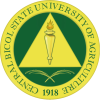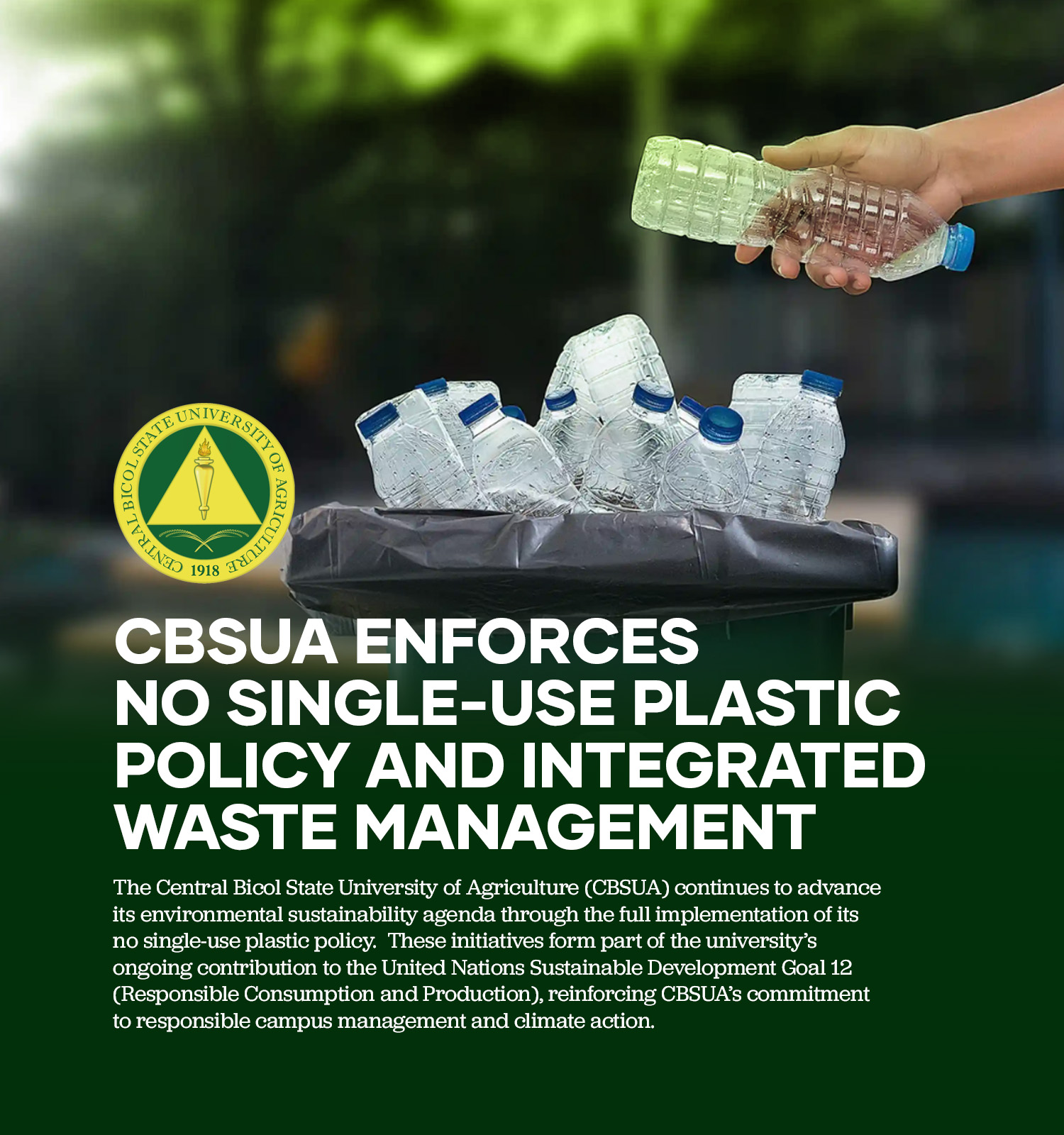The Central Bicol State University of Agriculture (CBSUA) continues to advance its environmental sustainability agenda through the full implementation of its no single-use plastic policy through the Office Memo 07-22. These initiatives form part of the university’s ongoing contribution to the United Nations Sustainable Development Goal 12 (Responsible Consumption and Production), reinforcing CBSUA’s commitment to responsible campus management and climate action.
𝗡𝗼-𝗣𝗹𝗮𝘀𝘁𝗶𝗰 𝗣𝗼𝗹𝗶𝗰𝘆: 𝗥𝗲𝗱𝘂𝗰𝗶𝗻𝗴 𝗪𝗮𝘀𝘁𝗲 𝗮𝘁 𝘁𝗵𝗲 𝗦𝗼𝘂𝗿𝗰𝗲
CBSUA maintains a strict ban on single-use plastics across all campuses. This policy includes the prohibition of plastic straws, disposable cups, plastic wrappers, and similar SUP items within university premises.
Key provisions include:
1. Strict avoidance of single-use plastics in canteens, stores, offices, and events.
2. Vendors and caterers are required to bring back the garbage they generate.
3. Regular monitoring of waste generation, including food waste, to promote reduction and responsible behavior.
This policy not only decreases plastic consumption but also cultivates a culture of environmental responsibility among students, personnel, and concessionaires.
𝗪𝗮𝘀𝘁𝗲 𝗦𝗲𝗴𝗿𝗲𝗴𝗮𝘁𝗶𝗼𝗻: 𝗦𝘁𝗿𝗲𝗻𝗴𝘁𝗵𝗲𝗻𝗶𝗻𝗴 𝗖𝗮𝗺𝗽𝘂𝘀-𝘄𝗶𝗱𝗲 𝗗𝗶𝘀𝗰𝗶𝗽𝗹𝗶𝗻𝗲
Complementing the plastic ban is CBSUA’s structured waste segregation system, implemented in accordance with RA 9003 (Ecological Solid Waste Management Act). All academic units, administrative offices, canteens, and residence facilities are required to:
– Segregate waste at the source into biodegradable, non-biodegradable/residual, and factory-returnable categories.
– Use segregated and labeled bins available throughout the campus.
– Follow an established collection schedule (e.g., biodegradable on Mondays, residual on Wednesdays, factory returnables on Fridays).
– Ensure proper packaging and timely placement of waste for pickup to prevent contamination and scattering.
This system ensures orderly waste flow, reduces the volume of mixed waste, and supports recycling efforts.
𝗠𝗮𝘁𝗲𝗿𝗶𝗮𝗹 𝗥𝗲𝗰𝗼𝘃𝗲𝗿𝘆 𝗙𝗮𝗰𝗶𝗹𝗶𝘁𝘆 (𝗠𝗥𝗙): 𝗦𝘂𝗽𝗽𝗼𝗿𝘁𝗶𝗻𝗴 𝗥𝗲𝘀𝗼𝘂𝗿𝗰𝗲 𝗥𝗲𝗰𝗼𝘃𝗲𝗿𝘆
CBSUA’s Material Recovery Facility plays a central role in the university’s waste management strategy. The MRF serves as the storage and sorting hub for residual and recyclable waste before these are processed or collected by accredited handlers. It supports the university’s recycling and recovery efforts, reduction of landfill-bound waste, and compliance with environmental standards.
CBSUA’s MRF and composting initiatives were also recognized in regional environmental reports, further highlighting the university’s active contribution to sustainable solid waste management practices in Bicol.
𝗖𝗼𝗻𝘁𝗿𝗶𝗯𝘂𝘁𝗶𝗻𝗴 𝘁𝗼 𝗦𝗗𝗚 𝟭𝟮: 𝗥𝗲𝘀𝗽𝗼𝗻𝘀𝗶𝗯𝗹𝗲 𝗖𝗼𝗻𝘀𝘂𝗺𝗽𝘁𝗶𝗼𝗻 𝗮𝗻𝗱 𝗣𝗿𝗼𝗱𝘂𝗰𝘁𝗶𝗼𝗻
Through these integrated initiatives, CBSUA demonstrates clear progress toward SDG 12 (Responsible Consumption and Production). The university’s efforts:
– Reduce waste generation through responsible policies,
– Promote efficient resource use through segregation and recovery,
– Strengthen campus-wide environmental awareness, and
– Institutionalize long-term, systems-based waste management solutions.
Together, these reinforce CBSUA’s role as a leading SUC championing sustainability, environmental stewardship, and climate-responsive operations.
𝗖𝗕𝗦𝗨𝗔’𝘀 𝗖𝗼𝗺𝗺𝗶𝘁𝗺𝗲𝗻𝘁 𝗠𝗼𝘃𝗶𝗻𝗴 𝗙𝗼𝗿𝘄𝗮𝗿𝗱
CBSUA continues to enhance its sustainability programs through capacity-building, consistent monitoring, stakeholder engagement, and improvements to its MRF operations. These ongoing efforts underscore the university’s strategic direction toward a greener, more resilient, and environmentally responsible academic community.



